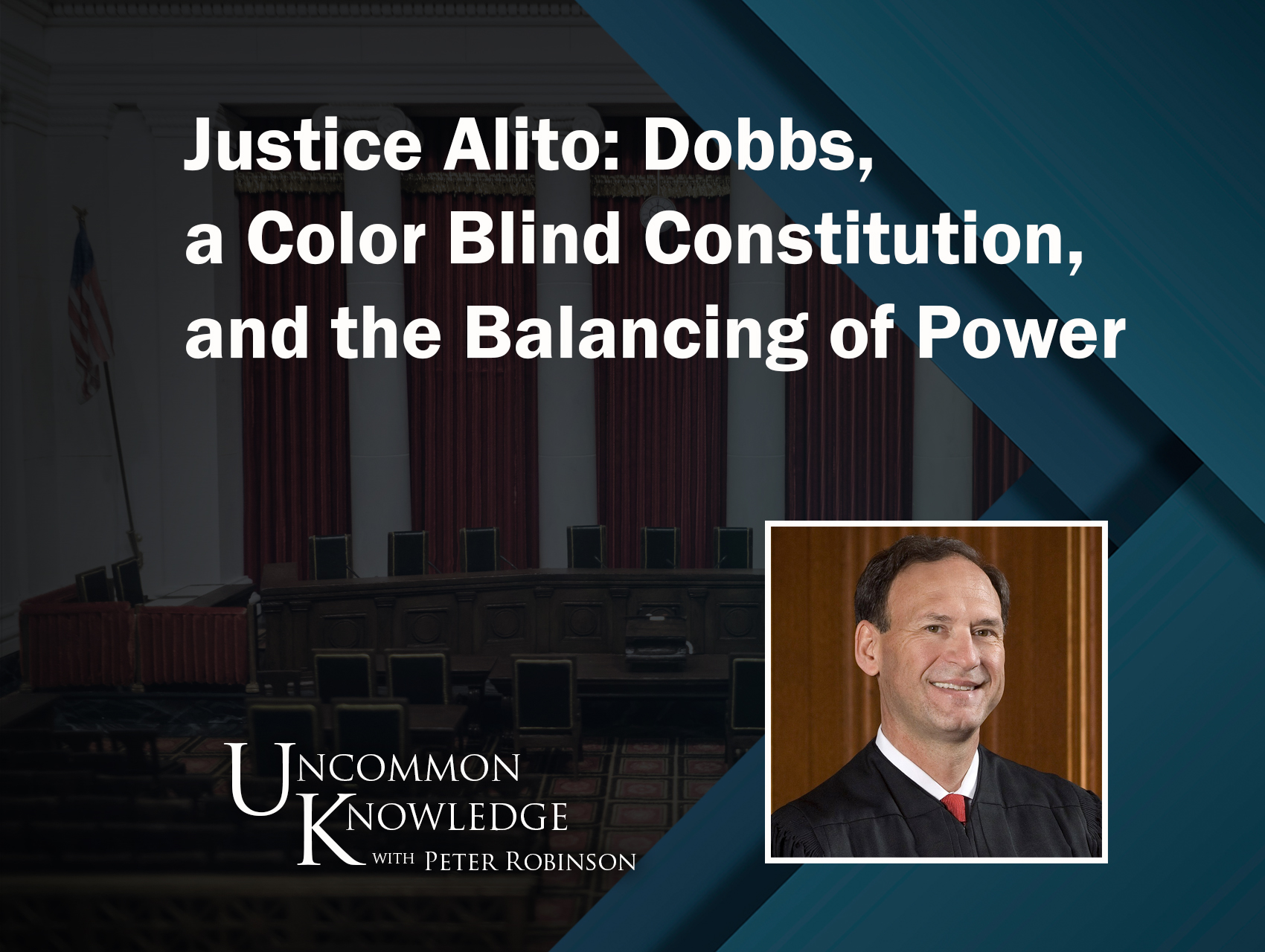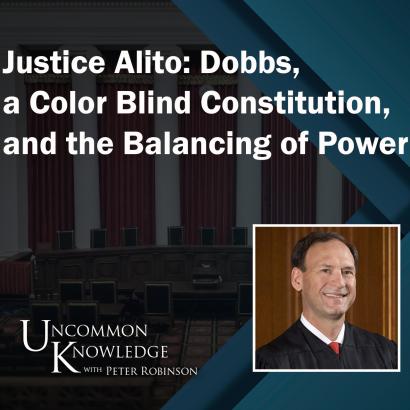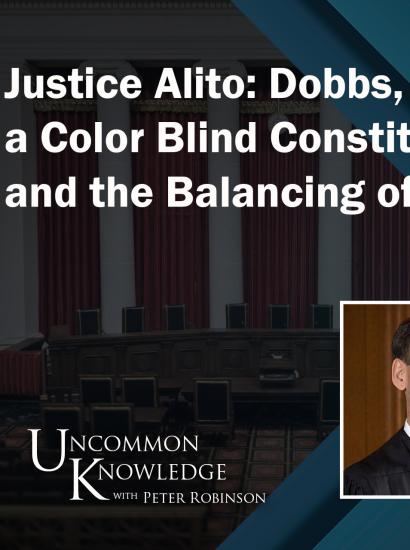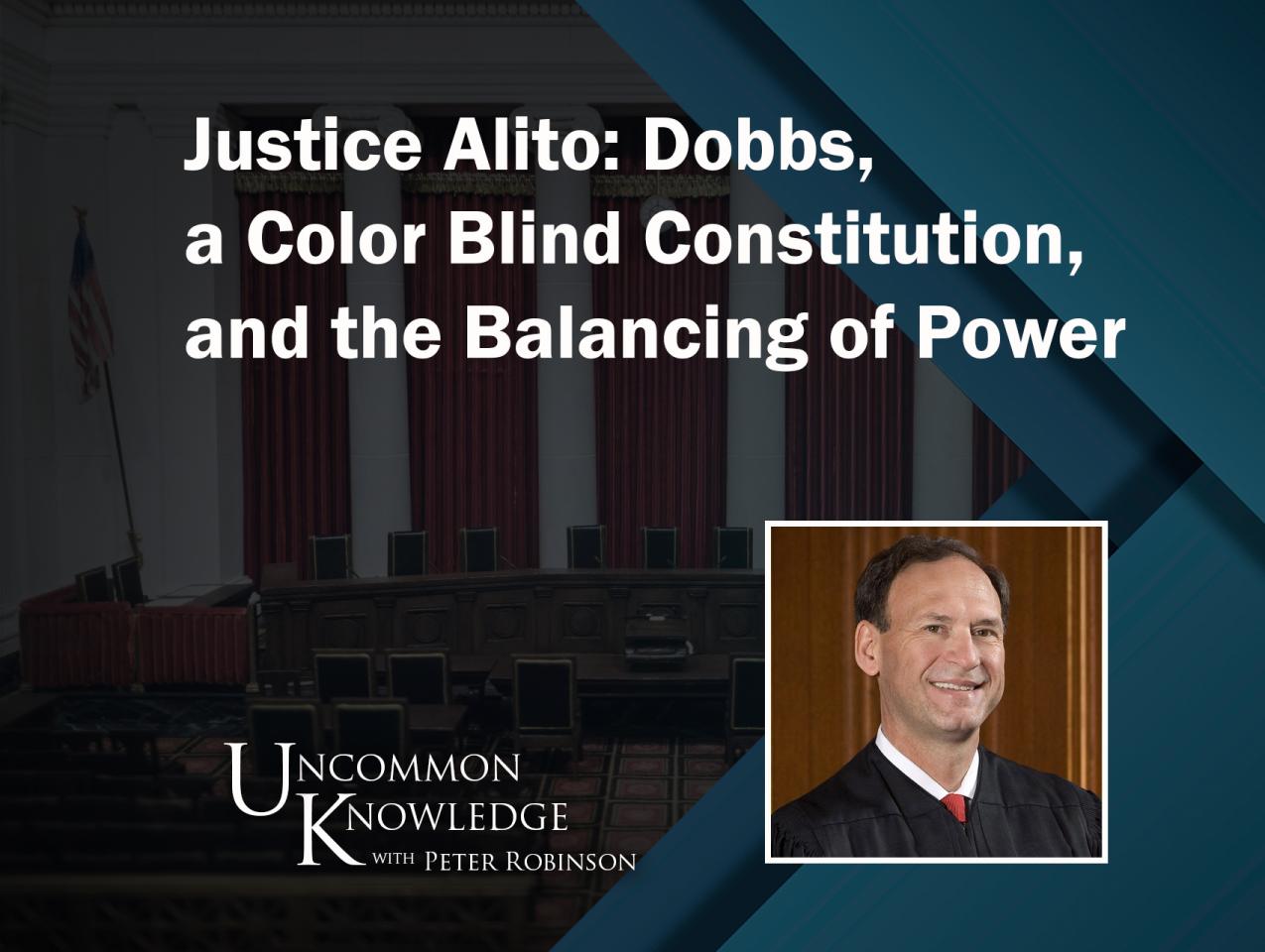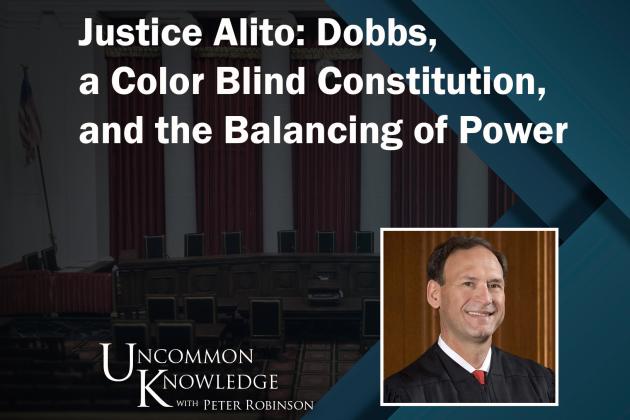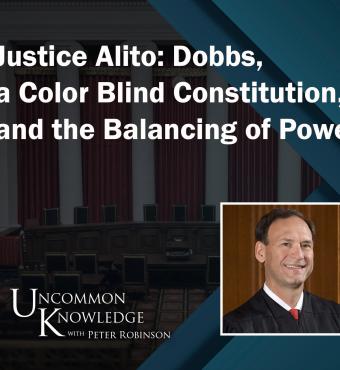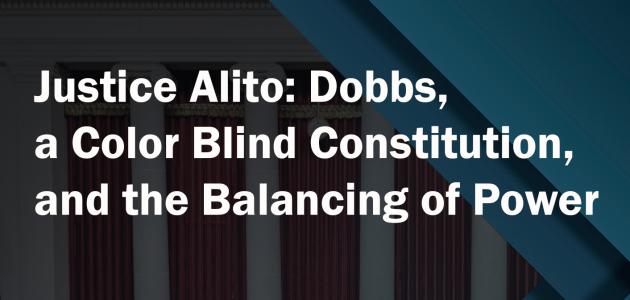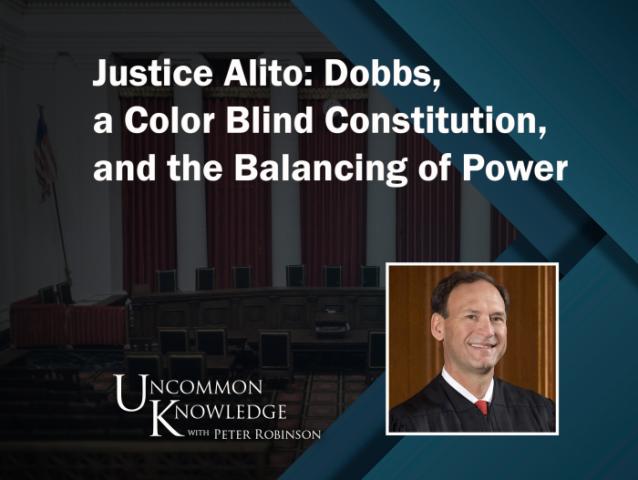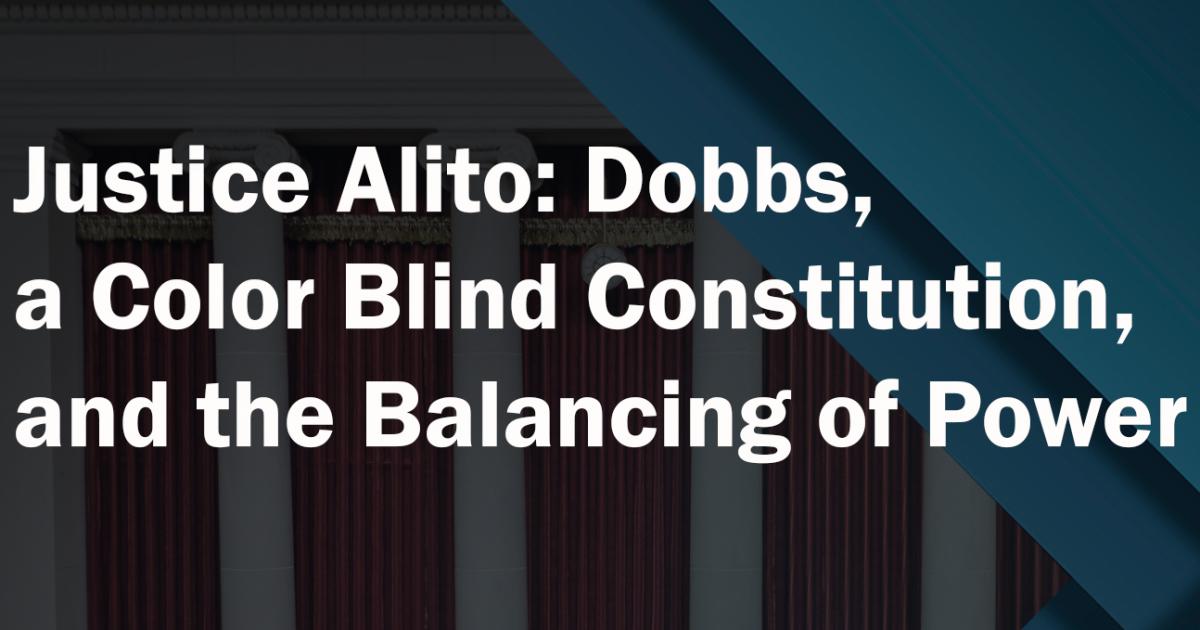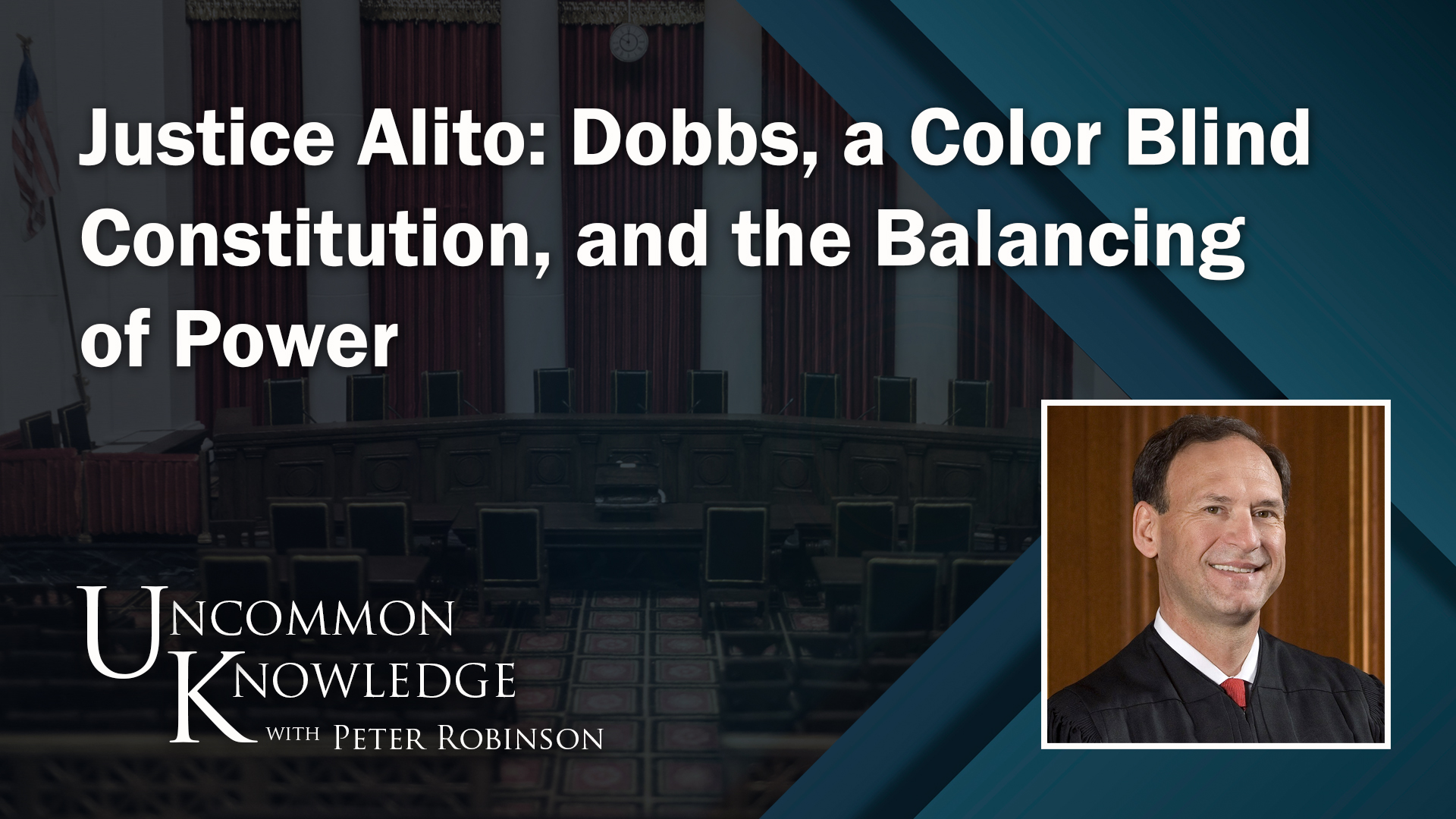- Judiciary
- Law & Policy
- Revitalizing American Institutions
In this wide-ranging conversation, Supreme Court Associate Justice Samuel Alito discusses the principles that guide his judicial philosophy. From his majority opinion in Dobbs v. Jackson to his views on originalism, precedent, and the role of the courts in American democracy, Alito offers a candid defense of the Constitution as a fixed and enduring document. He explores the meaning of the Equal Protection Clause, the limits of judicial power, and the tensions surrounding race-conscious policies. Justice Alito also reflects on the practical realities of the Court and the deeper meaning of constitutional interpretation, speaking with clarity, conviction, and with an eye toward the long view of American jurisprudence.
Recorded on June 6, 2025.
WATCH THE VIDEO
>> Peter Robinson: Welcome to Uncommon Knowledge, I'm Peter Robinson. Associate Justice of the United States Supreme Court, Samuel Anthony Alito Jr. grew up in New Jersey, earned his undergraduate degree at Princeton, and then earned his law degree from Yale. He began his legal career as an Assistant U.S. attorney in New Jersey, then served in the Reagan Administration, first as Assistant to the Solicitor General and then as Deputy Assistant to the Attorney General.
Have I got that right?
>> Justice Samuel Alito: Yes.
>> Peter Robinson: Excellent, in 1990, President George H.W. Bush appointed him to the Third Circuit Court of Appeals. Fifteen years later, President George W Bush nominated Justice Alito to replace retiring Justice Sandra Day O'Connor. Justice Alito is now third in seniority on the Supreme Court.
Justice Alito and I will not be talking about cases before the Court that would violate every protocol at this institution. But Justice Alito has been kind enough to offer this layman a tutorial in how to think about constitutional issues. Mr. Justice Alito, thank you for inviting us into this.
This is the West Conference Room of the Supreme Court Building.
>> Justice Samuel Alito: Well, welcome. It's a pleasure to have this opportunity.
>> Peter Robinson: The notion of a restoration. Here's this layman's first question. The Warren Court, which is the Supreme Court under Chief Justice Earl Warren, who served as chief from 1953 to 1969.
Let me quote legal scholar Daniel Frost quote, Chief Justice Warren is remembered primarily for extending rights to the weak, the disenfranchised and the oppressed. But even his admirers are not entirely certain the Constitution authorized him to do so. Then, beginning in the 1990s, I'm putting this to you to see if I have the basic point here correct.
Beginning in the 1980s or so, there arises a school that reasserts the importance of the original meaning of the Constitution. A school we now call, loosely, originalism. I believe you've called yourself a modified originalist. We can come to those modifications. Let me quote the late Justice Antonin Scalia.
Quote, the Constitution is not a living organism, for Pete's sake. It's a legal document. And like all legal documents, it says some things and it doesn't say others. So would it be correct to say that the originalist school does not see itself as a new school or doctrine of interpretation, but as a group of like minded scholars and lawyers who are engaged in what they see as an act of restoration.
Is that a fair summary?
>> Justice Samuel Alito: I think that is a fair summary. I think that the review of history that you provided is a fair one. A very sympathetic biographer of Chief Justice Warren said, and obviously I can't quote directly, but from memory. But he said that Chief Justice Warren had such strong views about what was good and right and beneficial for society that he didn't think those things were disputable.
And that was embodied in a lot of the work that was done during the Warren years. Sometimes it produced tremendous results, like Brown versus Board of Education. Sometimes the results were more debatable. And when the Warren era ended, scholars looked back, and I think they struggled to try to find a principled basis for the decisions that the Warren Court had handed down.
So that inaugurated a period of debate about how the Constitution should be interpreted. Justice Scalia, Judge Robert Bork, who was then a professor at Yale Law School. Ed Meese, later, when he became counselor to President Reagan and Attorney General, were, I think, the three pioneers of this originalist movement.
And what they argued is basically that the Constitution is a text and it should be read basically the way other texts are read. We read the words, they're understandable. The English language hasn't changed that much since the late 18th century. We can figure out what it means, where it refers to legal concepts, established legal principles.
We can explore what they were understood to mean at the time, and that's the way it should be interpreted. So it was an effort to provide a structured, disciplined, and restrained way of reading the Constitution.
>> Peter Robinson: And this is the part on which this layman is especially fuzzy.
Is it the contention of the originalists that Chief Justice Taft would have understood exactly what they were about. That there's a continuity between the originalist school and the fundamental canons of interpretation that preceded the Warren Court. And that it's the Warren Court that is in some way not the Warren Court alone.
You get the Burger Court, that follows some of the trajectories. That there's a period of three decades or so that departs from sensible understanding of the text. Is that roughly correct, that originalism is in continuity with the understanding of the Constitution that prevailed before the Warren Court? I'm putting things crudely, but that's the best I can.
>> Justice Samuel Alito: I think the core idea there is correct. But I think it should also be said that the whole idea of constitutional theory, which is now a very developed school of thought among constitutional scholars, was not prominent before the originalists came along. There was much less theorizing about how the Constitution should be interpreted.
So I do think that the pioneer originalists would say that what they were doing captured the essence of a lot of what happened after the founding and through the 19th century. But if you go back and you will not find the the kind of theoretical discussion that has come after that.
I once did a search through law reviews for the term constitutional theory, and it was not used that much until some point in just about the turning point that you mentioned, the late 1970s, early 1980s. Then it went up and now, of course, there's a lot of scholarship about it.
>> Peter Robinson: I see, all right. So this brings us to, I have this organized in my head is about four major concepts or questions for you, Justice Alito. Stare decisis, which is, of course, is the legal principle, if we're engaged in active restoration, what are we permitted to restore So we have to address, as best I can work it out, stare decisis, the principle that courts must be bound by previous decisions.
Two quotations. I've already read you the quotation from Daniel Frost that even Justice Warren's admirers are not entirely certain the Constitution authorized him to produce some of the decisions he produced. Here's, Retired Supreme Court Justice Stephen Breyer stare decisis does not exist simply to protect precedent that is right,it keeps the law stable by preventing the continuous reexamination of precedent that may well be wrong.
The fact that judges think an earlier case was incorrectly decided cannot be and never has been a strong basis by itself for overruling an earlier case close quote. Which, of course reminds me of the old saying by G.K chesterton that it's the job of progressives to make mistakes and the job of conservatives to keep them from.
To prevent them from being corrected so when does this Court feel bound by precedent, even if it may have some notion that the precedent was incorrectly decided and when does it come to the conclusion? When may it properly come to the conclusion that a decision was so incorrect that the Court must overturn it?
>> Justice Samuel Alito: Well, there's a variety of thinking on the question among the members of the Court now and in past years Justice Thomas is most willing of all the Justices, most willing to reconsider past precedents. If he thinks the past precedent is clearly wrong, he is more open to a reexamining it than, let's say, even Justice Scalia.
When Justice Scalia was on the Court, he was certainly in favor of reexamining egregious decisions under appropriate circumstances, but he did not think that it would be workable. I don't think I'm putting words in his mouth,i don't think he believed it would be workable for us to reconsider every past decision that figures in a case that comes before us.
>> Peter Robinson: Right so actually, I once interviewed Justice Scalia, and he brought up Marbury versus Madison. He said, suppose we're hearing a case, and the justice says, now, counsel, why do we have the right to even consider whether we should overturn this?
>> Justice Antonin Scalia: Do you think we have the power to ignore a statute enacted by Congress simply because, in our view, it's unconstitutional?
He says, yes, your honor you know Marbury versus Madison,I know, I know, Mark, but was it right let's rethink that you can't run a legal system that way reinvent the wheel every time you have a new case. All right, so that's
>> Justice Samuel Alito: that is what he thought and it really brings to mind something that occurred during an oral argument in a case called McDonald, which had to do with whether the Second Amendment right to keep and bear arms applies to the states and in that case, to the City of Chicago.
Without getting into the technicalities, whether or not it applied depended on an interpretation of the 14th Amendment. And there are two provisions of the 14th Amendment that could govern one is the Due Process clause, which is the way the court has analyzed this issue for more than 100 years well, more than 100 years.
And the other is the Privileges and Immunities Clause and a lot of scholars think the Due Process Clause was the wrong path it should have been the Privileges and Immunities Clause. And in this case, that's what the lawyer for Mr McDonald, who wanted to have the gun, was arguing.
And that position was supported by groups across the ideological spectrum, including libertarians on the one hand and progressives on the other. And we got a brief from some law professors who said, we look forward to the day when we can tell our students that the Supreme Court has corrected its mistake.
So the lawyers started to make this argument, and Nino cut him off, and he said, that argument is the darling of the professoriate, but you have 100 years of precedent, so get on to the rest of the argument. It was very telling because Nino was such a professor, I think, in his heart, through his entire career, but he recognized that deciding cases is different from writing law review articles.
>> Peter Robinson: All right, well, this brings us we're still under stare decisis this brings us to 2022 and Dobbs versus Jackson Women's Health Organization, in which the Supreme Court overturns, explicitly overturns Roe vs Wade of 1973 and Planned Parenthood vs Casey of 1970, 1992. And I'm sitting across from the justice who wrote the decision for the majority quote, roe was egregiously wrong from the start its reasoning was exceptionally weak.
And far from bringing about a national settlement on the abortion issue, Roe and Casey have deepened division we hold that Roe and Casey must be overruled. So if I'm spotting this correctly, you've you presented in that couple of sentences three different criteria was the decision egregious did it bring about any kind of national settlement has it been is it settled law?
And then the reasoning itself within well, of course that's egregious,so we have at least two was it egregious and even whether it was egregious or not, is it now settled law and in both cases, Roe fails have I got that right?
>> Justice Samuel Alito: Yes and those are two prominent criteria that I think we need to examine when we consider whether we're going to overrule precedent, which we do quite, quite sparingly.
But if it's egregiously wrong, if it has made a big practical difference, has it settled things or has it left things in an unsettled state. Those are certainly all considerations that we have to take into account.
>> Peter Robinson: All right, the topic of race,and if you'll permit me, I'm going to try to run through some history here, a few bullet points.
When the constitution is ratified in 1788, of course it gives the famous three fifths clause so that African American slaves are counted as only 3/5 of an individual. But it also gives Congress the power to end the importation of slaves, the international slave trade in 1808. And Congress does exactly that the first chance it gets It ends the international slave trade after the Civil War the 14th Amendment forbids states from denying citizens the equal protection of the laws.
And then the 15th amendment declares the right, quote, to vote shall not be denied on account of race, color or previous condition of servitude. We get the Jim Crow regime of the 1960s and then we get the Civil Rights act of 1964, banning discrimination based on race and employment, public accommodations and elsewhere.
So the layman skimming through the history says the founders wanted to get rid of slavery the founders were uneasy about race from the very get go. We see the way they handled it,I would, even if I could quote it from memory, I would I can't. Frederick Douglass referred to the three fifths clause as scaffolding that permitted the rest of the structure of the constitution to be erected, but that was to be removed at the first opportunity.
Again and again in our history, we get the assertion, no, we are not going to make judgments among our fellow citizens based on race. Then in 1978, which, let's face it, is a long time after the civil war and the civil rights legislation, the Bakke decision, the supreme court.
Supreme Court holds that university policies could still take race into account. And then in 2003, in Grutter, Grutter.
>> Justice Samuel Alito: Grutter.
>> Peter Robinson: Grutter, the Court upholds the use of race in university admissions once again. So if I may, we'll come to Students for Fair Admissions versus Harvard in a moment, the case that got decided in 2023.
But I look at this history, again, this is the layman thinking, I have no legal training at all. And it looks to me as though, the Court, on occasion in Dred Scott, the Court upholds racial discrimination with a snarl. The voice of Chief Justice Taney saying that African Americans do not have rights of the same kind as white men.
Or as in Grutter, the Court says it in the nicest possible way, Chief Justice or Justice Sandra Day O'Connor decision, quote, we expect that 25 years from now, the use of racial preferences will no longer be necessary. We don't like it, but for this moment, but in both cases, the Court is continuing to say, all right, we find making discriminations among our fellow citizens on the basis of race to be constitutional.
Why does this, it seems to me to be just as a historical matter, an unusually vexing matter. It comes before the Court again and again and again. The court, in the 20th century, the court is unhappy with it, but still permits it.
>> Justice Samuel Alito: Well, the Court's record on race has been up and down, and that's similar to the country as a whole.
The slavery and racial discrimination was the great flaw that was built into our constitutional system at the start with the three fifths clause, the clause that you mentioned about allowing the slave trade to continue for 20 years. And it has taken us a long time to work through these problems.
So, the Court was horrible and Dred Scott, of course, may have contributed to the outbreak of the Civil War. Then along came a case called Plessy vs Ferguson, 1896, at a time when social Darwinism and sort of scientific racism among the elites was at its peak. And the Court said that racial segregation was constitutional.
The first Justice, Harlan, John Marshall Harlan, wrote the best dissent in the whole history of the Supreme Court in that case. In Plessy. Yes, in Plessy, where he said that, in our country there's no superior race, there are no castes. The Constitution is colorblind, he was all alone.
>> Peter Robinson: And he was a Southerner, as I recall.
>> Justice Samuel Alito: He was a Southerner and he came from a slave owning family. But he was courageous and made that argument, which of course was true and has stood the test of time. And the Court finally, overruled in effect, Plessy and Brown vs Board of Education, 1954.
We saw the reaffirmation of the same principle that Harlan had articulated in Plessy in Dr. Martin Luther King Jr's famous speech at the Washington Monument, which everybody should be familiar with. I look forward to the day when my little children are judged not by the color of their skin, but by the content of their character.
But then in Bakken, the court did some backsliding, and I think it was well intentioned. It was perhaps thought that this was something that should be done for a period of time to try to get over the after effects of a long period of segregation and discrimination. But the precedent lasted and it metastasized, and I think it came to do great damage to our society.
So it was important to correct it in Students for Free Admissions.
>> Peter Robinson: Let me, if I may, on that case, set it up. 2023 Students for Fair Admissions versus Harvard, in taking race into account in admissions, the court found Harvard violated the 14th Amendment and the Civil Rights act of 1964.
Chief Justice Roberts writes for the majority, quote, eliminating racial discrimination means eliminating all of it. How do we understand that in relation to Grutter, that the court decided it couldn't wait 25 years? Is that a rebuke of Grutter, that Grutter was incorrectly decided? In other words, as best I can tell, one needs to understand what the court meant in relation to Grutter to understand where the court goes from here.
>> Justice Samuel Alito: Well, I can only speak to myself on that point, I think Greta was wrong, I think Bakke was wrong, I think that our constitution is colorblind. I find it hard to see how we're gonna hold together as a country and a country with people of every race and every ethnicity.
How are we gonna hold together if we don't regard each other simply as fellow human beings, as fellow Americans, and judge people based on their individual characteristics? So I think the whole path that the constitutional law took from Bakke until Students for Fair Admissions was a mistake. As I said, I think some people may have thought this is something we should do on a temporary basis.
That was the flavor of Justice O'Connor's opinion, but I think that was a mistake.
>> Peter Robinson: Well, so, justice leader, if I may, to put you just made a very striking assertion, which is that you believe the Constitution is colorblind. That it if I may probe that a little bit, I suppose that means it is unconstitutional in some large portion of the realms in which we live, professional life, public accommodation, politics, in various forms.
It is unconstitutional for us to draw distinctions among our fellow citizens on the basis of race, full stop.
>> Justice Samuel Alito: Yes, absolutely. I think that's the core principle with the equal protection clause on the 14th Amendment. And I think it's essential for the well being of our country.
>> Peter Robinson: What work needs to be done to make the fair admissions case, the permanent place it on a permanent footing, so the court doesn't backslide again, if you see what I mean.
>> Justice Samuel Alito: Well, I hope the court will not backslide. I don't think we will backslide, but I think that much litigation is probably gonna be necessary to enforce this principle because there are a lot of people who disagree with it and will look for ways to get around it.
In the last two terms, we've had two cases that illustrate this. And if you have a second for them, they're both cases involving the admissions criteria for public charter schools, one here in the DC area, three up in Boston. These are schools with very high academic standards, very tough admission standards based mostly on performance on a standardized test.
And the students, Asian-American students, did disproportionately well on these admission tests and therefore constituted, A percentage of the school population in both instances, that well exceeded their population in the school district or in the municipality in question. And in both cases, the school boards decided to change the criteria for the express purpose of bringing about better demographic balance, bringing down the number of Asian-American students.
>> Peter Robinson: Racial or ethnic balancing? Explicitly.
>> Justice Samuel Alito: Yes, and the 4th Circuit, and the 1st Circuit, 4th Circuit covers Virginia and states to the south, the 1st Circuit is up in New England. Those courts both said this is okay because even after the change in the admissions policy, the percentage of Asian-American students admitted to these schools is higher than their percentage in the population, and that makes it constitutional.
I think that's clearly wrong, I said so in opinions urging the court to take the cases, the court refused to take the cases. But that's the kind of thing that is gonna come up, I think, again and again and again, because there's a lot of resistance to the principle that the court adopted in students for fair admission.
And it's up to the lower federal courts to apply that decision, and if they don't do it, then I think we're gonna have to intervene as many times as is required to drive the point home.
>> Peter Robinson: I see. Freedom of speech and religion. First religion, this is you speaking at Notre Dame a couple of years ago.
Notre Dame University, quote, freedom of worship means freedom to practice religion in the privacy of your home or in your church or your synagogue or your mosque. But when you step outside into the public square in the light of day, you had better behave yourself like a good secular citizen, that's the problem we face.
Explain that.
>> Justice Samuel Alito: Well, I think it is the problem that we face because support for religious liberty unfortunately, has cratered in the last 20, 25 years. The high point, I would say, was 1996, when Congress passed the Religious Freedom Restoration Act. Congress was upset that a decision on the Supreme Court had not gone far enough to protect religious liberty, so they stepped in and they said, no, we're gonna do more, we're gonna provide more protection.
That law, RFRA passed with a voice vote in the House, in the Senate, 97 votes, signed happily by President Clinton, that's the state of the situation in 1996. 2015, the state of Indiana tries and enacts virtually an identical law, and there's furious opposition. The NFL, the NBA, the WNBA, the NCAA all threatened they're going to pull games out of Indiana States said, we're not going to allow any official travel to conferences in Indiana.
So the support has decreased, but I think that protection of religious liberty is required by our Constitution. And it's again like equality, it is essential for the well being of the country.
>> Peter Robinson: Two quotations, the First Amendment itself, Congress shall make no law respecting an establishment of religion.
And here's the second quotation, since you spoke at Notre Dame, I'm quoting the Notre Dame professor Phil Munoz writing just last year. The founders understood religious institutions have an important, arguably essential sounds like Justice Alito role to play in supporting American democracy. Government cannot and ought not be neutral toward religion, this is why religious liberty is and must remain American's first freedom, close quote.
Okay, so this layman, I'm personally totally in sympathy with Professor Munoz, but the language of the First Amendment says Congress shall make no law is respecting an establishment of religion. This was in the days of course, when Virginia had an established religion, the Anglican Church and the Puritan, various Congregationalist churches, I recall, was established in Connecticut.
And on it went, Congress shall make no law respecting establishment of religion, which is to say Congress won't impose a state religion, that's one matter. Phil Munoz is arguing, well, the founders understood that we actually need to support religion, I don't mean to put words in his mouth, but that's the way I read that passage.
There's a tension there, is there not or am I misreading this?
>> Justice Samuel Alito: Well, the two clauses need to be read together and they do seem to move in somewhat different directions. The establishment clause is very tricky because it's hard to understand exactly what is an establishment of religion, the core is what you mentioned, having an established church.
But it's been long agreed, and I certainly agree that the prohibition goes beyond that. What we have done, and I think we've taken the right approach to this in recent years, is to look to history, and history is very informative about what was permitted, what was viewed askance.
On the free exercise clause, it is very important to note that the Constitution singles out religion for favorable treatment. Congress shall make no law infringing the freedom of religion, it doesn't say what the French Declaration of the Rights of man said in 1789, just about the same time as our First Amendment.
They said, no one shall be disquieted, I think disquieted because of his opinions, including religious opinions. So it protected philosophical views, it protected views that were not based on religion but on something else that people might think is very important. But our Constitution singles out religion and gives it a higher, it gives it protection that is not afforded to views that are not religiously-based.
>> Peter Robinson: And what work needs to be done there? If public I can't remember who it was who said that it's fair to expect the judicial system to ignore the politics of the day, but naive to expect the judicial system to remain unaffected by the politics of the era, something like that.
And if public support for religion, public practice of religion, if the support, as you just said, is cratering, what can the court do over the long-term?
>> Justice Samuel Alito: Well, I think we have to stand up for the Constitution, there's a reason why we're not elected. We are not supposed to do what is popular, we're supposed to do what is right, we're supposed to interpret the Constitution and figure out what it means and then apply the Constitution.
That's the purpose of this institution, the core purpose of this institution, to prevent society at times. We're basically a democratic country, but the framers want to put some restraint on things that people might do during a particular area, because they're caught up in the emotions that are triggered by the events of the day.
So we have to stand firm on this, and I think we have done a pretty good job on it, but we have to keep it up because, Challenges will, challenges will continue to come.
>> Peter Robinson: Speech, again, the First Amendment, Congress shall make no law abridging the freedom of speech.
And here is Justice Alito in an interview with the Wall Street Journal last July. The First Amendment was not intended to prohibit any regulation of speech. All right, can you explain that one?
>> Justice Samuel Alito: Yes, it refers.
>> Peter Robinson: I have a feeling you could.
>> Justice Samuel Alito: It refers to the freedom of speech and the freedom of speech is a phrase with an established meaning, a phrase that had an established meaning when the First Amendment was adopted.
The same is true of the Second Amendment, the right to keep and bear arms, as Justice Scalia says, said in his opinion in Heller for the Court. That was a right that was understood at the time to have certain dimensions.
>> Peter Robinson: These are both historically accessible to us today.
>> Justice Samuel Alito: Yes, they are and so it was understood at the time when the First Amendment was adopted that there is no right, for example, to threaten people. Those are words but you don't have a right to threaten people, you don't have a right to defraud people, you don't have a right to defame people.
So there was no right, the freedom of speech was not then and still is not interpreted to protect what is defined as obscenity. So there were well established limits on historically established limits on the right.
>> Peter Robinson: I see, All right, from your 2020 remarks to the Federalist Society, quote, one of the great challenges for the Supreme Court going forward will be to protect freedom of speech.
Although that freedom is falling out of favor in some circles, we need to do whatever we can to prevent it from becoming a second tier constitutional right. And again, there are nine of you on the Court, you've already made it clear that lifetime appointment, what is there for a purpose?
The wider originalist movement, what kind of work needs to take place in the law schools, in the legal journals, and among scholars who know each other, what kind of support do you need on the Court?
>> Justice Samuel Alito: Well, we need all the support that we can, all the support that we can get, I do think you refer to the colleges and the law schools.
What is going on there should ring some alarm bells because freedom of speech is not protected in colleges and universities. There are a lot of speakers who say unpopular things are disrupted, when I talk to recent law graduates, law students, they say if they're conservatives, they say, I didn't feel free to speak out when I was in law school.
I had to watch everything that I said, I was afraid that I was gonna be harassed or intimidated.
>> Peter Robinson: Clerks.
>> Justice Samuel Alito: Yes.
>> Peter Robinson: So these are kids from the best law schools in the country who presumably, if they make it to a personal interview with you, whip smart, tough, resilient, and even they say they didn't feel free to say.
>> Justice Samuel Alito: No they make it through, but they exercise a degree of prudence about what they will say and where they would say it. That's not what law school, and it's not what a university is supposed to be about. It's supposed to be a place where people can speak freely and test out their ideas.
So that's one thing that's alarming, some of the restrictions that were placed on expression by social media a few years ago.
>> Peter Robinson: Yes, during COVID.
>> Justice Samuel Alito: Very, very alarming, we had a case last year called Murphy, which I dissented. I thought the court missed the boat in the case, but it involved very intense White House pressure on Facebook to trim what was said particularly about, about COVID the origin of the virus and the safety of the vaccines and masking and social distancing.
They put a lot of pressure on Facebook not to depart from the position that the government wanted to promote. That's very dangerous and interestingly, Mark Zuckerberg later has said that he regrets that they gave in to the government pressure as much as they did. So that's something that we have to be concerned with going forward manipulation of social media.
>> Peter Robinson: Justice Alito, originalism itself. Original meaning or originalism and I'm gonna work my way to your position because you've called yourself, I think you called yourself a practical originalist and a modified originalist, I found in different interviews, you put it slightly different ways. A couple of quotations, here's your friend, the late Justice Antonin Scalia.
Quote, the Constitution that I interpret and apply is not living but dead, or as I prefer to call it, enduring. It means today not what current society, much less the Court, thinks it ought to mean, but what it meant when it was adopted. Retired Justice Stephen Breyer, the two of them sparred often.
Quote, I have found the legal world too complex, too different from the world the textualists assumes. Good judges will first and foremost put considerable weight upon the purposes that a statutory phrase seeks to achieve. Law is tied to life, and a failure to understand how a statute is so tied can undermine the human activity of that the law seeks to benefit, close quote, Justice Alito.
>> Justice Samuel Alito: Well, I agree with Justice Scalia that the meaning of the Constitution does not change. Nino was usually very good at framing things in ways that the public would understand and that would be attractive to the Constitution. I don't know whether saying that the Constitution is dead as opposed to living was perhaps the most felicitous phrasing but the core point is correct.
The Constitution, the meaning of the Constitution does not change, but the world changes, and the issues that come before the Court change. And so it's important to understand that originalism is not a scientific formula that yields a result mechanically. If you just feed in the variables, you sit back and it produces a result, always without any exercise.
>> Peter Robinson: We could replace all nine of you with A.I.
>> Justice Samuel Alito: Well, that may happen before too long but until that point and Justice Scalia recognized this, he recognized it. I'll give you an example, in 1791, when the Fourth Amendment was adopted, there were no thermal imaging devices. 2001, the court had a case called Killo, and the question was whether a police officer seated in a car on a public street.
Where he had every right to be, was searching a house, if the officer focused a thermal imaging device on the house, could see through the walls and detect heat emitting objects inside the house. So you can't look at the world as it existed in 1791 to see what people thought about thermal imaging devices, they didn't exist.
So you have to draw an analogy. Was that situation more like a police officer on a public street looking through an open window, not blocked by shades or drapes, and seeing what goes on inside? That is not a search. Is it more like that or is it like a full blown search where officers go inside the house and they can see things that are not visible through a window that the homeowner has left unshaded?
>> Peter Robinson: For which they would need a warrant?
>> Justice Samuel Alito: Right, and Nino said, no, it's like a search, you need a warrant. So, there's a question of judgment, what is the appropriate analogy? And this comes up in many originalist cases, and there's room for disagreement about what is the proper analogy.
>> Peter Robinson: And you call yourself a practical originalist, to distinguish yourself from?
>> Justice Samuel Alito: From an originalist scholar, principally. There's a big difference between originalist scholarship and originalist judging. For one thing, if you're on a multi member court and you're trying to produce an opinion that at least four of your colleagues will agree with, you have to make compromises.
And scholars, sometimes they jointly write a book or an article, but much of the time they write on their own and they don't have to worry about pleasing anybody else. So that is a big difference. In a system of precedent, after a case is decided against you, let's say the court makes a decision and I'm in dissent, and now another case comes along that is similar, so the earlier decision is cited as a precedent.
I have to make a decision. Do I say, I'm sticking to my guns, you were wrong before, so leave me out of the conversation. Or do I say, well, I thought you were wrong, I still think you were wrong, but I'll accept for present purposes that that is the governing decision, and then try to make the best of that prior precedent.
Those are two examples of ways in which being an originalist judge is quite a bit different from being an originalist law review article.
>> Peter Robinson: Your job is tricky.
>> Justice Samuel Alito: It is tricky, it involves judgment, that's what judging involves.
>> Peter Robinson: So, originalism, when originalism seems to go awry, again, layman's questions here.
2020 case, Bostock versus Clayton County, the Supreme Court found it unconstitutional to fire an employee for being LGBTQ. The reasoning, the Civil Rights Act of 1964 for bad discrimination based on sex. And the Court found that it is impossible to discriminate against a person for being homosexual or transgendered without discriminating against the individual based on sex.
Two quotations regarding that case. Here's Justice Gorsuch writing for the majority. Quote, this Court has explained many times over many years that, when the meaning of a statute's terms is plain, our job is at an end. That sounds very originalist. The people are entitled to rely on the law as it is written, close quote.
Justice Alito writing in dissent. Quote, because no amendment of Title VII of the Civil Rights Act has been enacted, the prohibition of discrimination because of sex still means what it has always meant. The Court attempts to pass off its decision today as the inevitable product of the textualist school of statutory interpretation championed by our late colleague Justice Scalia, but no one should be fooled.
Our duty is to interpret statutory terms, and here you quote Justice Scalia, to mean what they conveyed to reasonable people at the time they were written, close quote. So how can it be that originalism, fidelity to the meaning of the text, can produce two such different results?
>> Justice Samuel Alito: Well, reasonable minds don't always agree.
I think Justice Gorsuch is a great judge, great justice, but we just disagreed very strongly in that particular case. And I would say that Bostock read the words, this is the Civil Rights Act of 1964, adopted in 1964. I would say that the majority read those words mechanically and did not take into account the context which requires, I think, us to ask, what did Congress mean when it adopted that in 1964?
And I think once you consider that, it's perfectly plain that discrimination on the basis of sex at that time, was understood by members of Congress and would be understood by the general public. People just reading the bill to say this prohibits discriminating against women or discriminating against men, but not.
>> Peter Robinson: For the simple reason that transgenderism had never entered anybody's head before.
>> Justice Samuel Alito: Transgenderism, no, was not even a thing, really. It was not well established at all in 1964. And I think this is the way speech works, I don't understand what you say to me, if I'm reading any text or interpreting any oral statement, I don't just look up all the words in the dictionary and put that together.
I'm taking other, there are other clues, that's the way language works, it's always contextual.
>> Peter Robinson: All right, Justice Alito, a couple of questions about contemporary issues. And as I stipulated at the beginning, if I wander into an area that's before the corridor is in one way or another inappropriate, just pull your earlobe and I will instantly retract the question.
But injunctions, here's about as far as this layman can get. On the one hand, it cannot be the case that any chief executive is permitted to rule unquestioned by executive order, simply by issuing fiats. Can't be the case, on the other hand, we now have, this is my count as of today, somebody may have retired or been hit by a car.
But as of today, as I believe, we now have 677 district court judges, it likewise cannot be the case that each of these 677 men and women, is permitted on his or her own to thwart the policy of a democratically elected chief executive.
>> Peter Robinson: So, what do you do?
>> Justice Samuel Alito: Well.
>> Peter Robinson: How does one think this through? This is not easy.
>> Justice Samuel Alito: It is not easy, and that is a problem that we have confronted. Increasingly over the past six, seven, eight years and that continues and you've exactly framed the situation on the one hand. Well, what sparks all of this is the great difficulty of getting legislation enacted by Congress.
At the Constitution deliberately sets up a law making procedure that is time consuming and laborious. So you have to have the same bill has to pass in the House and in the Senate and it has to be signed by the President and then on top of that, there's the Senate filibuster rule.
So you need 60 votes in the Senate that makes it very hard to get legislation passed. So as the difficulty of getting legislation passed has increased, presidents have increasingly looked to see what they can do on their own. If you go back to 2014, President Obama famously said, well, I'm not going to depend on trying to get legislation through Congress, I have my pen, I have my.
>> Peter Robinson: I have a phone and I have a pen.
>> Justice Samuel Alito: I have a phone and I have a pen, so the pen was what he could do executive orders, rules, other executive directors, directives under President Biden that increased. And we had a number of cases here involving the unilateral exercise of executive power by the Biden administration for giving up to $500 billion of student loans, requiring all the participants in Medicare and Medicaid to require their employees to be to be vaccinated.
Directing Texas to take down the barbed wire it had strung across the border, requiring, imposing a moratorium on evictions in areas that were hard hit by Covid. By my count, we had 14 emergency applications filed by the Solicitor General during the Biden years. And now during the first what is it for months of the Trump administration, I mean, the graph keeps going up and up.
So the President's exercise their executive, their executive power in an assertive way, and that's immediately challenged in district court. Sometimes by coalitions of attorneys General from states where the majority is not favorable to whatever the, to what the president is doing 677 district judges, district judge says this is unlawful.
I order you to stop and I order you not only not to do this to the parties who were before me, I order you not to do this at all anywhere in the country. A universal injunction, this will be in place, a preliminary injunction, it will be in place through the entire duration of the litigation, which may take two or three years before it could come up to us.
So as a result, if the court of appeals in that area doesn't intervene, it comes immediately to us in the form of an emergency application and that's what we're getting. So with the Trump administration, we've had cases involving the Alien enemies Act of 1798, cancellation of contracts and grants with USAID, dismissing members of what were frequently called independent agencies like the National Labor Relations Board and so forth.
And that is what we have been facing that is what we are facing right now.
>> Peter Robinson: Could I just ask that workload each of you has how many clerks?
>> Justice Samuel Alito: Four.
>> Peter Robinson: Four clerks, so it's nine justices and nine times four clerks and here comes the 1798 Alien and Sedition Act.
And here comes an this is, I mean, I'm surprised I don't hear footsteps in the hallways outside right now of clerks scurrying off to look at this law book or that law book. That's just an enormous amount for this body, which is composed, after all, extremely intelligent individuals, extremely well trained individuals, but a small number of human beings.
>> Justice Samuel Alito: Well, it is a great challenge and some of these require some of the issues are all the issues I've mentioned, I didn't mention the birthright citizenship issue. All of these issues are important and they're difficult some of them, like the Alien Enemies Act or birthright citizenship, calls for a lot of historical research.
We do get very good briefs and we get a lot of them now we get a lot of them, so a lot is placed before us on a silver platter, so to speak but it can be a very large platter, heavy platter.
>> Peter Robinson: The unitary presidency versus Independent agencies, again, if I stray into material I ought not to let me know a couple of quotations here.
John Yoo and Robert Delahunty in National Review this past spring, quote, the Constitution makes the president solely responsible for executing the laws and protecting the nation. What the Constitution does not permit is the creation of an independent branch of government that answers to no one, close quote, here's legal reporter Greg Rosolski on NPR.
Quote, historians generally agree that the first independent agency, that is, there have been others, the first independent agency in the US government was the Interstate Commerce Commission founded in 1887. In other words, there are a lot of independent agencies and they've been around for a long time, so how does one balance that one?
>> Justice Samuel Alito: Well, that's a difficult issue and the question of the removal of the dismissal of heads of multi member agencies like that, the NLRB, for example, is something we're going to have to decide probably next term. So I can't talk, I don't want to talk to it directly but the general, I mean, I can say this, the general rule is the president is given the executive power.
And so I think there's general agreement the vast majority of the executive branch is under the President's control and the President can appoint the cabinet officers and other other political appointees. There's the issue of whether these independent agencies have a different status. The court held in a case called Humphreys Executor, yes, they do but that was what if that was I asked about 1935, I think something like that, all right.
>> Peter Robinson: A couple of last questions if I might.
>> Justice Samuel Alito: It was later than 1935 but it was in that that era. All right.
>> Peter Robinson: If I may, a video of your late colleague Justice Scalia, your late colleague and close friend Justice Scalia.
>> Justice Antonin Scalia: But what matters is the Constitution, we had a wonderful thing here.
We have a wonderful thing here and I truly believe it can't continue if we simply turn over so much of the democratic self-governance which is what makes us great to unelected judges, that's what I care about.
>> Peter Robinson: That was on an interview on this program and I was struck at the time and I have to confess it's bothered me ever since.
The way justice go, that formulation in the first part of that clip that you saw, Justice Scalia said, I felt unselfconsciously we had a good thing here. And then he immediately corrected himself and said, we have a good thing here. But that's always made me worry that just maybe he felt the wheels were coming off the project.
We talked this, but we framed this conversation as a discussion about a great act of legal restoration, how's the project going?
>> Justice Samuel Alito: Well, I think the results are mixed. There's been a lot of progress on a lot of fronts. Justice Scalia had a lot to do with that.
He cared a lot about government structure, which is what we were just talking about, the power of the president versus the power of the courts. He cared a lot about that. He was interested in limiting, limiting is not exactly the right word, in holding all three branches of the government to the power that they have in the constitution.
If they have it, fine, exercise it to the full extent, but don't go beyond the power that is given to you under the constitution. And he tried to enforce that against all three branches of government, Congress, the executive, the judiciary. On that little clip, he's talking about the judiciary.
He was very concerned, and he had reason to be concerned at the time when he turned his interests to constitutional law and then became a judge in the early 1980s in what he thought judges were doing. Which was really using their authority consciously or unconsciously to promote their own public policy views, and he wanted to put a stop to that.
And that is one of the major threads of his work. So he wanted clear rules as much as possible. He hated nebulous rules, he hated balancing tests, he wanted clear rules.
>> Peter Robinson: And he won an intellectual victory.
>> Justice Samuel Alito: He won an intellectual victory to a large degree, but it's never settled.
>> Peter Robinson: No, victory is in the- It's not permanent. It's even on this court.
>> Justice Samuel Alito: It's not complete. So he championed originalism, which we've talked about, textualism. And people who you might have thought were on the other side of the debate on both of those issues have said, we're all originalists now, we're all textualists.
>> Peter Robinson: Justice Cagle.
>> Justice Samuel Alito: Yes, but different people have different ideas about what originalism means and what textualism means.
>> Peter Robinson: Last question, Justice Alito, from your commencement address at Franciscan University, you're talking to kids here, graduating kids. When you venture out into the world, you may well find yourself in a job or a community or a social setting where you will be pressured to endorse ideas you don't believe or to abandon core beliefs.
It will be up to you to stand firm, close quote. What are the resources on which you personally draw in standing firm on this court? Also, frankly, just as a human being, after the Dobbs decision in 2022, there were protesters outside your house, all kinds of harassment, threats, and so forth.
A lot of people would have thought about just packing it up and taking retirement. What makes you keep coming back to this institution? And when you're sitting at that conference table with your eight colleagues who are all well spoken, impressive type A individuals, how do you hold your own?
>> Justice Samuel Alito: Well, I do my best. And I recognize that it's an enormous privilege to be able to do what I'm doing. Nobody should think I deserve to be on the Supreme Court because I'm the best-qualified person to be on the Supreme Court, I'm better qualified than anybody else.
Nobody should think that way. There is no Supreme Court aptitude test that everybody takes, and so the person who gets the highest score gets the nomination. It's like being struck by lightning, it's a great privilege, nobody forces us to take the job or keep the job. But if you really love the constitution and our system of government and want to preserve it, then I do think you have to stand firm.
And to be honest, it's a lot easier for me to do that than it is for those college students that I was talking to, because I have life tenure. I've had life tenure for the past 35 years. So in my opinions, I can say what I think is right, and I'm not gonna get fired for doing it, and I'm not gonna get my pay docked.
There may be other unhappy consequences that follow. But for those college students, they're gonna have to try to hold down jobs, and they may be pressured in exactly the way that I mentioned, to endorse things, accept things, say things that they know are wrong. And I hope they will have courage, I hope they will have fortitude.
>> Peter Robinson: I told you a bit of a fib, that wasn't the last question. Here's the last question, and this is about the role of a judge within our legal system. So you've been on this court 35 years, imagine somebody graduating from Princeton today as you did in the 1970s.
You were class of.
>> Justice Samuel Alito: 72.
>> Peter Robinson: 72, all right. And this Princeton kid wants to go to law school, has that figured out. And already knows that becoming a public defender would involve a certain amount of just gratification for sticking up for the little guy, becoming a corporate lawyer is beginning to climb the ladder at one of the big firms.
The rewards there are obvious, you can count them, you put them in your bank account, and the partners at firms in this town pull down multiple millions of dollars a year these days. Why should any kid graduating from Princeton today, as you did in 1972, ever set his sights or her sights on becoming a judge?
>> Justice Samuel Alito: Because it is a way of contributing powerfully to the well being of our society, it's an important job. The other jobs you mentioned are also important, and they can be done in ways that are productive for our society. We need good public defenders, it's an important position.
If someone wants to do it, more power to them. I think you can practice as a business lawyer in a way that contributes to society. If you do that within the bounds of your ethical and professional responsibilities and you can go down the line. But being a judge, judges have a lot of power, they have a lot of responsibility, it's important for the job to be done well.
>> Peter Robinson: Mr. Justice Samuel Alito, the 110th Justice to serve on the Supreme Court of the United States, thank you.
>> Justice Samuel Alito: Thank you.
>> Peter Robinson: For Uncommon Knowledge, the Hoover Institution, and Fox Nation, I'm Peter Robinson.







